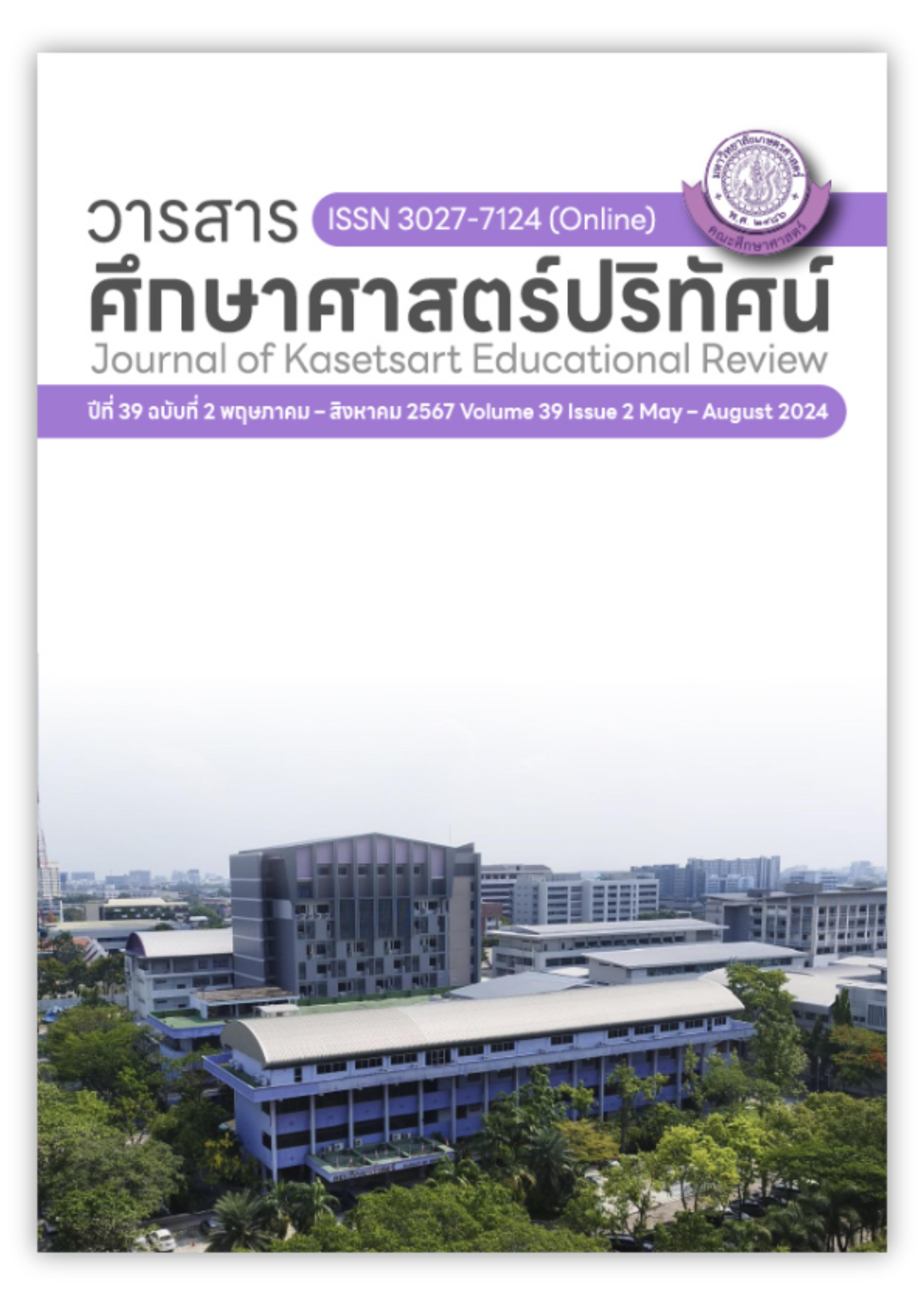การใช้ชุดกิจกรรมนิทานAI ผสานศิลปะสร้างสรรค์ เพื่อส่งเสริมการตระหนักรู้ในตนเองของเด็กปฐมวัยผ่านความร่วมมือกับผู้ปกครอง
คำสำคัญ:
การตระหนักรู้ในตนเอง, ชุดกิจกรรมนิทานAI ผสานศิลปะสร้างสรรค์, เด็กปฐมวัย, ความร่วมมือกับผู้ปกครองบทคัดย่อ
การศึกษาครั้งนี้มีวัตถุประสงค์เพื่อเปรียบเทียบการตระหนักรู้ในตนเองของเด็กปฐมวัยก่อนและหลังการใช้ชุดกิจกรรมนิทานAI ผสานศิลปะสร้างสรรค์ผ่านความร่วมมือกับผู้ปกครอง กลุ่มเป้าหมายเป็นเด็กปฐมวัย ชาย - หญิง ที่มีอายุระหว่าง 3 - 4 ปี กำลังศึกษาอยู่ในระดับชั้นอนุบาลปีที่ 1 ภาคเรียนที่ 2 ปีการศึกษา 2566 โรงเรียนสาธิตฯ แห่งหนึ่งในกรุงเทพมหานคร จำนวน 10 คน เครื่องมือที่ใช้ในการศึกษา คือ 1) ชุดกิจกรรมนิทานAI ผสานศิลปะสร้างสรรค์ผ่านความร่วมมือกับผู้ปกครอง 2) แบบประเมินการตระหนักรู้ในตนเองของเด็กปฐมวัย โดยมีพฤติกรรมบ่งชี้ 3 ด้าน ดังนี้ 1) การระบุบอกเล่าถึงอัตลักษณ์ของตนเอง 2) การมีความรู้สึกที่ดีต่อตนเอง 3) การรับรู้ว่าตนเองเป็นส่วนหนึ่งของกลุ่ม จำนวน 12 ข้อ ทำการวิเคราะห์ข้อมูลด้วยการหาค่าเฉลี่ย ค่าส่วนเบี่ยงเบนมาตรฐาน และการวิเคราะห์เชิงเนื้อหา ผลการศึกษา พบว่า เด็กปฐมวัยที่ใช้ชุดกิจกรรมนิทานAI ผสานศิลปะสร้างสรรค์ผ่าน ความร่วมมือกับผู้ปกครอง มีคะแนนการตระหนักรู้ในตนเอง หลังการทดลองสูงกว่าก่อนการทดลอง ทั้งโดยรวมและรายด้าน โดยก่อนการทดลอง มีค่าเฉลี่ยเท่ากับ 16.30 คะแนน และส่วนเบี่ยงเบนมาตรฐานเท่ากับ 0.94 และหลังการทดลอง มีค่าเฉลี่ยเท่ากับ 32.10 คะแนน และส่วนเบี่ยงเบนมาตรฐานเท่ากับ 1.10 โดยรายด้านที่มีคะแนนเฉลี่ยการตระหนักรู้ในตนเองของเด็กปฐมวัยหลังจากการทดลองสูงที่สุด คือ การมีความรู้สึกที่ดีต่อตนเอง รองลงมาคือ การรับรู้ว่าตนเองเป็นส่วนหนึ่งของกลุ่ม และการระบุบอกเล่าถึงอัตลักษณ์ของตนเองตามลำดับ
เอกสารอ้างอิง
American School of Bangkok (2023). How to promote lifelong learning for lifelong learning for your children. https://www.asbsk.ac.th/th/article/how-to-motivate-children-to-pursue-lifelong-learning [in Thai]
CASEL. (2020). Social and emotional learning (SEL). https://casel.org/fundamentals-of-sel/.
Chaiyachok, A. (2019). Creative use of technology to foster young children in the 21st century. Journal of Education Studies, 47(4), 519-538. https://doi.org/10.58837/CHULA.EDUCU.47.4.27 [in Thai]
Department of Health (2019). Choose stories by age. https://multimedia.anamai.moph.go.th/help-knowledgs/read [in Thai]
Department of Health (2021). Young children addicted to screens risk slow development. https://multimedia.anamai.moph.go.th/news/031163-01 [in Thai]
Department of Health (2023). The Department of Health recommends that young children avoid all types of screens, fearing slow development and future vision problems. https://multimedia.anamai.moph.go.th/news/121066 [in Thai]
Distance Education Institute. (2023). Storytelling techniques. https://g.co/kgs/cJHnY2M [in Thai]
Epstein, J. L. (1983). Effects on parents of teacher practices of parent involvement. Report No. 346.
Equitable Education Research Institute. (2021, December 28). 8 things to know when teaching children to know themselves. https://research.eef.or.th/know-yourself [in Thai]
Heick, T. (2013). 10 Roles for artificial intelligence in education. https://www.teachthought.com/the-future-of-learning/roles-for-artificial-intelligence-in-education.
Hirunchalothorn, P. (2017). Parent Education. Early Childhood Education, Faculty of Education, Kasetsart University.
Kaosim, J., et al. (2021). The development of problem solving ability of the early childhood student by cooperative art activities feature though the story telling. NEU Academic and Research Journal, 11(1), 1-13. [in Thai]
Khamchuenwong, N. (2020). Early childhood development and emotional foundations for quality growth. https://researchcafe.tsri.or.th/development-and-temperament-of-early-childhood. [in Thai]
Khlaikham, U., Hirunchalothorn, P., & Samahito, C. (2021). Learning activity provision through literature-based to tnhance self-awareness of young children. Journal of Education Rajabhat Maha Sarakham University, 18(3), 195-207. [in Thai]
Kongkeo, C. (2024). ChatGPT started in action and research. https://www.car.chula.ac.th/pdf/CHATGPT.pdf. [in Thai]
Maneephruek, N. (2022). Development of digital technology integrated art activity package to promote motivation in art creation for preschoolers. [Doctoral dissertation], Chulalongkorn University. https://digital.car.chula.ac.th/cgi/viewcontent.cgi?article=7636&context=chulaetd [in Thai]
Ministry of Education. (2020). Guidelines for promoting development of children aged 3-6 years for parents. Office of the Basic Education Commission, Ministry of Education.
Ministry of Education Republic of Singapore. (2022) Educators’ guide for values, Social and emotional competencies and learning dispositions. https://www.nel.moe.edu.sg/
Queen Sirikit National of Child Health. (2020, January 10). Enhance children's development through storytelling. https://shorturl.asia/cPDUi [in Thai]
Sapcharoen, C., Hirunchalothorn, P., & Samahito, C. (2022). Using learning package “The smart kids smart use” to enhance economics literacy in young children. The Golden Teak: Humanity and Social Science Journal (GTHJ.), 28(4), 176-193. https://so05.tci-thaijo.org/index.php/tgt/article/view/255150/176624 [in Thai]
Thongpraduppeth, A., and Hirunchalothorn, P. (2022). The effects of using parent involvement activity packages“Try it you can do” to develop self-help skills of young children aged 2-3 years. Kasetsart Educational Review, 38(2), 148-159. [in Thai]
UNICEF. (2019). Learning social and emotional skills in pre-school. https://www.unicef.org/northmacedonia/learning-social-and-emotional-skills-pre-school
ดาวน์โหลด
เผยแพร่แล้ว
ฉบับ
ประเภทบทความ
สัญญาอนุญาต
ลิขสิทธิ์ (c) 2024 วารสารศึกษาศาสตร์ปริทัศน์

อนุญาตภายใต้เงื่อนไข Creative Commons Attribution-NonCommercial-NoDerivatives 4.0 International License.
บทความทุกบทความเป็นลิขสิทธิ์ของวารสารคณะศึกษาศาสตร์ มหาวิทยาลัยเกษตรศาสตร์ วิทยาเขตบางเขน
วารสารศึกษาศาสตร์ปริทัศน์ (Kasetsart Educational Review)






